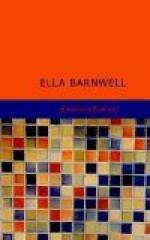act. This was noticed more than once by Algernon;
who, perhaps, more than either of the others, felt
from the first that strong dislike, that suspicious
repugnance to the stranger, which can only be explained
as one of the mysteries of nature, whereby we are
sometimes warned of whom we should shun, as the instinct
of an animal makes known to it its inveterate foe;
and though he strove to think there was nothing of
evil meant by a circumstance apparently so trifling—that
the glance of the stranger was simply one of admiration
or curiosity—yet the thought that it might
be otherwise—that he might be planning
something wicked to the fair being before him—haunted
his mind like some hideous vision, made him for the
time more distrustful, more watchful than ever, and
was afterward reverted to with a painful sensation.
The features of Algernon also exhibited an expression
of remorse and hopeless melancholy; the reason whereof
the reader, who has now been made acquainted with the
secret, will readily understand. The face of
Ella, too, was paler than usual—more sad
and thoughtful—so much so, that it was remarked
by Mrs. Younker, who immediately instituted the necessary
inquiries concerning her health, and explained to
her at some length the most approved method of curing
a cold, in case that were the cause. In striking
contrast to the sober looks of the others—for
Younker himself was a man who seldom exhibited other
than a sedate expression—was the general
appearance and manner of Isaac. He seemed exceedingly
exhilarated in spirits, yet kept his eyes down, and
appeared at times very absent minded. Whatever
his thoughts were, it was evident they were pleasing
ones; for he would smile to himself, and occasionally
display a comical nervousness, as though he had some
very important secret to make known, yet was not ready
to communicate it. This had been observed in him
through the day; and was so different from his usual
manner, and so much beyond any conjecture his mother
could form of the cause, that at last her curiosity
became so excited, that to restrain it longer was like
holding down the safety-valve to an over-heated steam
boiler; and, accordingly, taking advantage of another
mysterious smile, which Isaac chanced to display while
looking at a large piece of corn bread, already on
its way to his capacious jaws, she exclaimed:
“Why, what on yarth is the matter with
you, Isaac, that you keep a grinning, and grinning,
and fidgetting about all to yourself so much like
a plaguy nateral born fool for?”
So loudly, suddenly and unexpectedly was this question
put—for all had been silent some minutes
previous—that Isaac started, blushed, dropped
the bread—already near enough to his teeth
to have felt uncomfortable, had it been capable of
feeling—endeavored to catch it—blundered—and
finally upset his plate and contents into his lap,
in a manner so truly ridiculous, that Ella and Mrs.
Younker, unable to restrain their mirth, laughed heartily,
while the stranger and Algernon smiled, and the stern
features of the father relaxed into an expression of
quiet humor seldom seen on his countenance.




